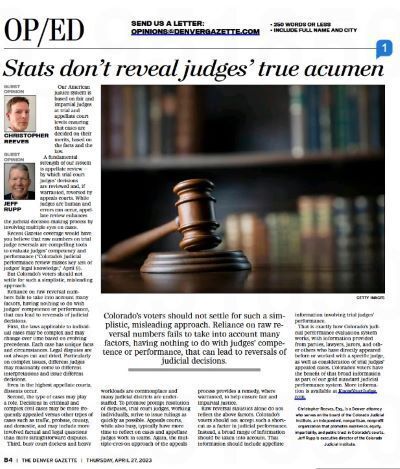
[Note: This CJI op-ed originally appeared in the April 27, 2023, issue of the Denver Gazette in response to several articles by David Migoya. Reprinted here with permission.]
Our American justice system is based on fair and impartial judges at trial and appellate court levels ensuring that cases are decided on their merits, based on the facts and the law.
A fundamental strength of our system is appellate review—by which trial court judges’ decisions are reviewed and, if warranted, reversed by appeals courts. While judges are human and errors can occur, appellate review enhances the judicial decision-making process by involving multiple eyes on cases.
Recent Gazette coverage would have you believe that raw numbers on trial judge reversals are compelling tools to evaluate judges’ competency and performance (“Colorado’s judicial performance review misses key test of judges’ legal knowledge,” April 9).
But Colorado’s voters should not settle for such a simplistic, misleading approach.
Reliance on raw reversal numbers fails to take into account many factors, having nothing to do with judges’ competence or performance, that can lead to reversals of judicial decisions.
First, the laws applicable to individual cases may be complex and may change over time based on evolving precedents. Each case has unique facts and circumstances. Legal disputes are not always cut and dried. Particularly on complex issues, different judges may reasonably come to different interpretations and issue different decisions.
Even in the highest appellate courts, dissents occur.
Second, the type of cases may play a role. Decisions in criminal and complex civil cases may be more frequently appealed versus other types of cases such as traffic, probate, county, and domestic, and may include more involved factual and legal questions than more straightforward disputes.
Third, busy court dockets and heavy workloads are commonplace and many judicial districts are understaffed. To promote prompt resolution of disputes, trial court judges, working individually, strive to issue rulings as quickly as possible. Appeals courts, while also busy, typically have more time to reflect on cases and appellate judges work in teams. Again, the multiple-eyes-on approach of the appeals process provides a remedy, where warranted, to help ensure fair and impartial justice.
Raw reversal statistics alone do not reflect the above factors. Colorado’s voters should not accept such a shortcut as a factor in judicial performance. Instead, a broad range of information should be taken into account. That information should include appellate information involving trial judges’ performance.
That is exactly how Colorado’s judicial performance evaluation system works, with information provided from parties, lawyers, jurors, and other others who have directly appeared before or worked with a specific judge, as well as consideration of trial judges’ appealed cases. Colorado’s voters have the benefit of that broad information as part of our gold standard judicial performance system. More information is available at KnowYourJudge.com.
Christopher Reeves, Esq., is a Denver attorney who serves on the board of the Colorado Judicial Institute, an independent, nonpartisan, nonprofit organization that promotes excellence, equity, impartiality, and public trust in Colorado's courts. Jeff Rupp is executive director of the Colorado Judicial Institute.

